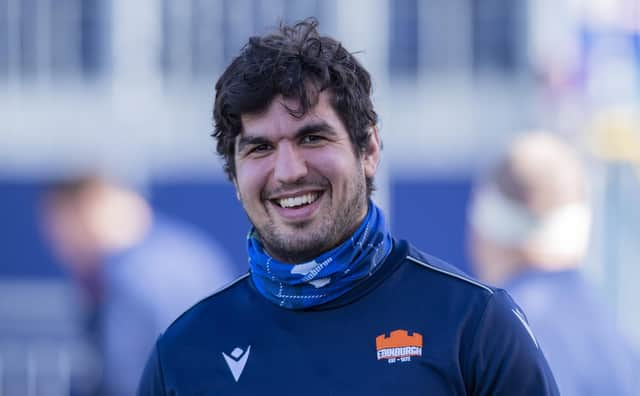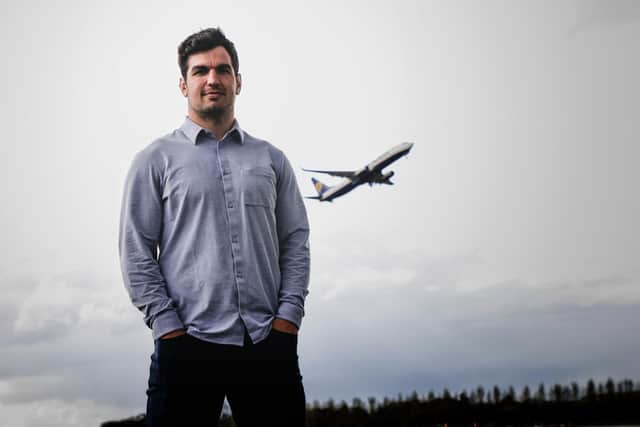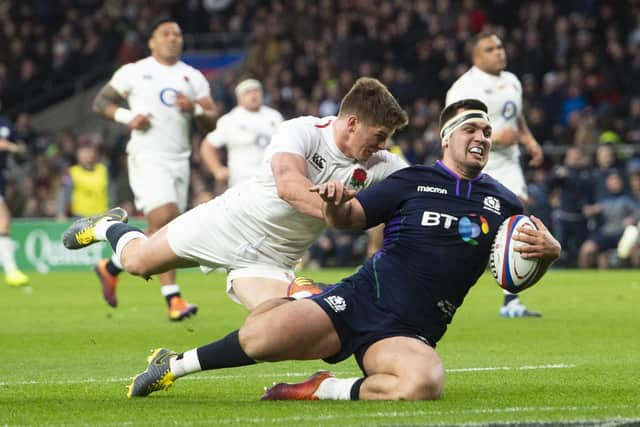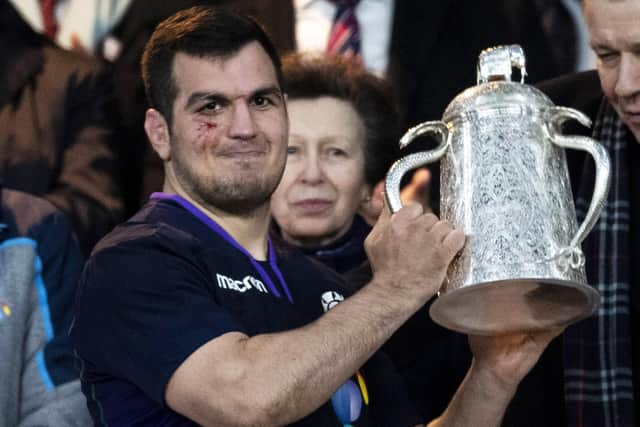Stuart McInally on his rugby career, 2019, and why he's so in love with flying and becoming commercial pilot


Fans of Airplane! will recognise these lines from the disaster movie spoof. But the Scotland hooker – born a full decade after the film’s release – looks at me like I’m deranged. Then he looks at the team’s PR like he’s wondering if his laptop could suddenly and mysteriously snap shut and, oh dear, the Zoom connection has been lost and we can’t seem to get it back.
But there’s a reason for this line of inquiry and, once I’ve explained to McInally that in the flick this was pilot speaking – however inappropriately to a bemused young visitor to the flight deck – he relaxes, smiles and of course the answer to two of these questions is yes. (Which ones? Oh come on … ).
Advertisement
Hide AdAdvertisement
Hide AdYou see, Rambo as he’s known around Murrayfield and today at the World Cup warm-up squad’s hotel, has always wanted to be a fly guy. He craved a life in the clouds before rugby got in the way (estimably so, 47 caps thus far, a swashbuckling try in the greatest-ever Calcutta Cup match). Whenever he got time off from rugby he was up in the air, improving his technique. Now, after he hangs up his boots for good, McInally is going to earn his wings as a commercial pilot.


I’m fascinated by this and tell him so, apologising in advance for opening the discussion with it. Absolutely fine, he says, he could talk about planes all night, and urges me to shut him up if he gets too carried away.
“For as long as I can remember it was always the dream to be a pilot,” says McInally, 32, after a training session for today’s game against Italy. “As a wee boy I was always excited to go on holiday. Where we would be going wasn’t important; the big thing was the airport and being around planes.
“A tremendous day was when my father, who’d been given a flying lesson as a present, took me with him to this club at Turnhouse. I was young and probably can’t remember anything else from that age but everything about that day was exciting: the turns, the steepness and yet how stable the plane was, the controls which looked so complicated, the chatter on the radios, the pilot being so slick. I thought: I want to do this.”
McInally wasn’t a planespotter, busing it out to Edinburgh Airport with notebook and lunchbox, but even now when he’s driving to training under the flight path, or during the grunt and heave out on the field and a plane passes overhead, he always looks up. “That doesn’t get old, and it convinces me that flying is definitely what I want to do now.”


His best Christmas present growing up was a remote-controlled plane. It came from Wonderland, the long-established toy emporium in the capital’s Lothian Road. “Great shop,” I say, and at this it seems McInally thinks he’s talking to someone similarly in love with aviation. He might not be, but resumes his endearing tale about how he plotted the maiden voyage across Boroughmuir’s Meggetland, but, banking right when he meant to bank left, was forced to look on in horror as the model fighter jet crashed into a house, possibly just as the occupants were sitting down to their turkey. “Thankfully it wasn’t smashed up. There was a dent in the nose which was cool, like my plane had seen some heavy action.”
He continues on the theme and I don’t have the heart to stop him: “At school I studied maths and physics because I knew they were important subjects for aviation. I took them to Advanced Higher level to make sure I got good grades. And then I was all set to go to Queen’s University, Belfast to study aerospace engineering only for rugby to intervene.”
McInally, who began as a flanker, was marked out as a hot prospect when emerging from George Watson’s College and was tipped as a future Scotland captain. Two trips to Murrayfield with his rugby mates from school – Jason White leading the Scots to Calcutta Cup triumph in 2006 and Mike Blair repeating the feat a couple of years later – convinced him that rugby would be an exciting diversion.
Advertisement
Hide AdAdvertisement
Hide Ad“I remember Jason lifting the trophy and being blown away by the happiness in the stadium and how one result could bring such joy. I wondered to myself: could I do this? During both games I was amazed at how calm the Scotland players were, given there must have been nerves. Everyone looked so assured and after that I aspired to be the same.”


But McInally admits there was anything but calmness in the dark blue ranks in perhaps his most famous game skippering his country – 2019’s 38-38 draw at Twickenham, a match with a storyline rejected by even the most fantasy-obsessed of Hollywood studios for being simply too far-fetched. “In the first half we were making England look like world-beaters. We’d forgotten the gameplan and were all over the place. When it got to 31-0 I was under the posts struggling to make any eye contact with the guys. I was thinking: ‘Somebody needs to do something here.’ Not for one second did I think it would be me!
“That plan had been to get on [Owen] Farrell’s foot, stop his big kicking game. I managed to charge him down in our own half. Still, the tryline was a long way off.” McInally’s score seemed no more than a consolation, even with the second half still to come. “We were shell-shocked. That was a tough time to be captain because some Scotland fans were already leaving the stadium. We were letting them down badly.”
The moment, then, for a rousing speech, something Churchillian? “There’s nothing you can really say to players in a situation like that. At elite level, everyone is so professional. They know what they’re doing, or if things are not going well, what they’ve got to do. I was never an ‘arms in, look at me’ captain. But Gregor [Townsend, head coach] was very calm. He said: ‘Let’s go out and win the second half.’” Five more exciting tries had the team on the brink of the greatest of all comebacks until a bamboozled England managed to draw level right at the death. To this day McInally doesn’t know how the Scots didn’t emerge victorious from a game they looked like losing most horribly, and doesn’t suppose he ever will.
He starts on the bench for the first of the four-game preparation for France, hoping to join the fray at some stage, for he remembers that it was in a World Cup warm-up against Italy in 2015 that he claimed his first cap. He’s already signed off for Edinburgh and making the squad for this tournament would round it all off sweetly for him.
“All my best moments in rugby have come in a Scotland jersey,” says McInally, while admitting that the World Cup hasn’t really been too kind to him. He was thrilled to be selected for that 2015 match in Turin. “All week in the build-up my lineout throws were bad. Big Jim [Hamilton] gave me it tough. Thankfully the game went okay, although by the end I was knackered. Test rugby was the big step-up everyone told me it would be. I couldn’t use the excuse of being this converted back-row anymore, not when in training I was having to scrummage against Fordy [Ross Ford], Dicko [Alasdair Dickinson] and WP [Nel]. Crikey, talk about deep end! I needed to perform.”
But in the finals in England McInally never got the chance as a neck injury, possibly from pushing himself too hard to prove himself front row-worthy, forced him out before they began. “I was gutted, in tears. But I wasn’t going to be content with having been capped [the once]. I was determined to get to ten, 20, 30 and now I’m on 47 I’m hoping there might be just a few more. I always wanted to make a serious contribution to Scottish rugby and hope I’ve done that. I learned from 2015, as you should always try and do from a setback, and came back stronger.”
So what did he learn from 2019? “Ah, very good question!” he says with a wry smile. In the last World Cup Scotland failed to get out of the group, with skipper McInally being dropped for the game against hosts Japan which sealed their fate. “Firstly, I was so happy when Gregor asked me to be captain, a huge honour. But in our opening match against Ireland we didn’t play well. I’d like to think I did learn about pressure, how to be in a crisis. We then had to beat Samoa with a bonus point, which we did. But that World Cup is a bit of a blur, frankly, and of course it was tough [to be left out].
Advertisement
Hide AdAdvertisement
Hide Ad“That took a bit of time to get over. My wife Nat’s family live in Perth, Australia so we went there for a few weeks. At moments like these it’s easy to make excuses and blame others, but they’re when you can learn key lessons. That experience made me more resilient, more assured in my instincts. I could talk about 2019 for hours although I don’t particularly enjoy speaking about it.”
Stuart Hogg took over the captaincy and the responsibility proved no less challenging for the full-back, but in the wake of the latter’s abrupt decision to quit the game, McInally praises his contribution to the team. “What a ludicrous career he had. One bench and 99 starts – incredible. It’s sad for him but I’ve been in pro-sport long enough to know that folk come and go. We can’t dwell on this. We’ve got a World Cup ahead of us and great guys ready to play 15. The end gets all of us and it will get me very soon.
“I’m proud of myself for stopping on my terms, rather than being forced out. There will be no bitterness about not being given a new contract or not being selected anymore. That will enable me to become a Scotland fan again – right away – and look forward positively to my new career.
“Of course I’m going to be sad when I no longer pull on a Scotland jersey. I’ll miss the camaraderie. Pilot training will be very lonely, at least for the first nine months – ground school, self-study, libraries. As a rugby player I could have had a rotten night of no sleep from being kept up by my little boy Ollie but my grumpiness would disappear 20 seconds into training by a team-mate making me laugh. And of course I’ll miss the excitement of match days.”
The conversation has banked back towards aviation with McInally enthusing about Top Gun, the new Idris Elba TV drama Hijack, proposing to Nat with him at the controls for a hop over to Islay and with Ollie on his lap trying out the cockpit of the Concorde retired to the National Museum of Flight at East Fortune.
“Why do I love planes? Well, first and foremost it’s amazing they can fly. That they do means folk can go right round the world, visit places they would otherwise never see. Ach, it’s hard to put into words why I do,” he says, while managing this pretty well.
Hardly surprising, he’s always been a confident flier. “Once, with Scotland Under-20s, it felt like the plane was nosediving. I’d just come out of the loo and was thrown forward. I guessed we’d been in a bit of conflict with another aircraft and had to lose some altitude. Everyone was really scared but the crew were calm and so was I.
“Hopefully rugby will stand me in good stead for flying. It’s taught me about dealing with adversity, thinking clearly under pressure, the importance of teamwork.” So has he thought about his flightdeck manner, how he might sound talking to passengers and even made notes for a script? “Well, I think my radio voice is pretty good. I remember on a visit to air traffic control at Edinburgh asking if they got a lot of private pilots coming through airspace and was that annoying? No, they said, but their tolerance depended on them being assured on the radio. If you um and ah a lot you’ll tend to be held at the [Forth] bridges. But if you’re crisp and correct, and maybe there’s some other activity at the airport, you’ll be asked: ‘Golf-alpha-foxtrot, are you visual with the plane on final approach?’ ‘Yes.’ ‘Okay, so pass above and behind.’
“When I’m whisking holidaymakers somewhere nice I’ve not rehearsed what I’ll say but will try and show a sense of humour.”
Fly well, Rambo, but maybe don’t mention gladiators or Turkish jails.
Comments
Want to join the conversation? Please or to comment on this article.